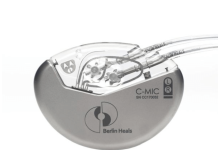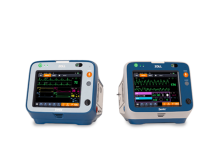CroíValve, an Irish-U.S. based medical device company with a novel, transcatheter solution for tricuspid regurgitation (TR), today announced initiation of its Early Feasibility Study (EFS) for the DUO™ Tricuspid Coaptation Valve System, following FDA IDE and CMS approval. The TANDEM II trial is a prospective, multi-center, non-randomized single-arm study to assess the safety and performance of the DUO Tricuspid Coaptation Valve System in patients with severe or greater symptomatic TR.
Related: FDA clears SnoreLessNow mandibular advancement device
DUO consists of a coaptation valve that works in tandem with the native tricuspid valve to restore valve function. The device is delivered using percutaneous techniques and is secured using a novel anchor system which leaves the right heart and native valve apparatus untouched. The implant procedure is straightforward, uses standard imaging and is suitable for a broad patient cohort, accommodating the large anatomical variability seen in this patient population. The European First in Human TANDEM I trial showed strong symptomatic improvement in patients across all key measures. The treated population was highly symptomatic and represented the broad range of anatomies in TR patients. Additionally, these cases demonstrated the procedure is quick to learn and perform, without the need for complex imaging. The TANDEM II feasibility study will further develop the clinical validation of this novel technology.
“We are delighted to initiate TANDEM II, with strong interest in participation in the study from leading U.S. centers. This marks a significant step forward in our efforts to continue generating clinical evidence demonstrating the safety and effectiveness of DUO,” stated Lucy O’Keeffe, CEO of CroíValve. “We are confident it has the potential to revolutionize the standard of care by redefining how TR is treated, and ultimately enhancing the lives of patients in need.”
In addition to this significant milestone, CroíValve has appointed Martin B. Leon, M.D. as chair of its clinical advisory board. A distinguished pioneer in interventional cardiovascular medicine, Dr. Leon is the Mallah Family Professor of Cardiology at the Columbia University Irving Medical Center College of Physicians and Surgeons and Director of the Columbia Center for Interventional Care (CICC) at New York-Presbyterian Hospital/Columbia University Medical Center. He also serves on the Executive Board of the New York-Presbyterian/Columbia Heart Valve Center. Dr. Leon was the Founder of Transcatheter Cardiovascular Therapeutics (TCT) symposium and Chairman Emeritus of the Cardiovascular Research Foundation (CRF).
“I’m excited about the study bringing this uniquely designed device to patients in the U.S. and guiding it as Chair of the Clinical Advisory Board,” said Dr. Leon. “I believe the DUO system can simplify the treatment of TR patients, with a predictable procedure that can be performed with standard imaging techniques. Additionally, with minimal anatomical exclusions, it can reach a broad population. It has the potential to emerge as a meaningful advancement in the field of TR treatment.”
TR is a severe heart condition that occurs when the tricuspid valve, on the right side of the heart, fails to close properly. This results in blood being pumped backwards into the right atrium and venous system causing debilitating symptoms. TR can significantly impact quality of life. Despite these substantial risks, there are limited treatments available for patients with TR.




